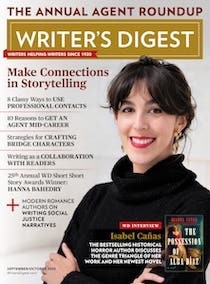Nonfiction Words of Wisdom from Agent Ted Weinstein
On Wednesday, Ted Weinstein was one of the four literary agents who participated in our “Ask the Agents” panel at the conference. Ted, who specializes in nonfiction books, was full of wisdom on the panel. Inside, you can find four especially nice tidbits from him.
On Wednesday, Ted Weinstein was one of the four literary agents who participated in our "Ask the Agents" panel at the conference. Ted, who specializes in nonfiction books, was full of wisdom on the panel. Below, you can find four especially nice tidbits from him.
Four Tips on Submitting Nonfiction
1. Platform is the first thing he looks for when evaluating a nonfiction book proposal. On the subject of platform, Ted advises that nonfiction writers should "assume they are self-publishing." By that, he means that you should not count on any help from the publisher in selling the book. They will distribute it, yes, but once it hits the shelves, you have to make sure it gets off the shelves. If you expect no backing from the publisher to do this, you are, essentially, self-publishing in a way, and will make sure that you have a platform.
On this topic, he added that writers will sometimes come along and say "If my book gets published, I'll be famous!" Then Ted quips back, "No, if you get famous, they'll publish your book!"
2. You must submit one or a few sample chapters with a nonfiction book proposal. Concerning what chapter(s) to submit, do not submit the introduction if you are only submitting one sample chapter. Instead submit the actual Chapter 1, not merely the introduction itself.
3. When comparing your book to other titles in the marketplace, he advises two things. First of all, use the term "comparable titles" rather than "competitive titles." Second, try to prove how your book is like the Olympic rings. Show all these different rings exist—all these different types of books. But no book can link them together like yours!
4. He said he rarely asks for an exclusive look at a book proposal, but on the rare occasions that he does, he asks for no more than one week. That timeframe, he says, is more than enough for any agent to be exclusively reviewing a proposal.
Chuck Sambuchino is a former editor with the Writer's Digest writing community and author of several books, including How to Survive a Garden Gnome Attack and Create Your Writer Platform.



